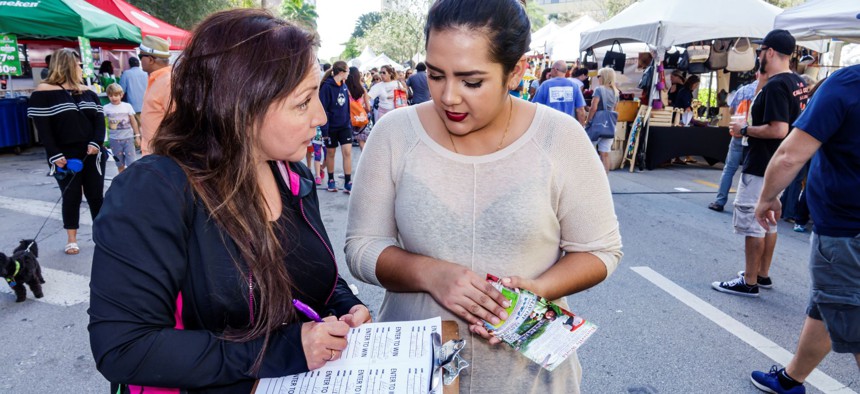For effective community research, get the right people at the table

Woman taking a survey at the Carnaval Miami Latin Cultural Street Fair. Jeffrey Greenberg/Universal Images Group via Getty Images
When people with lived experience participate in a research project’s design, data collection and analysis, they can increase engagement, build trust and lay the groundwork for system-level change.
When designing policies and services aimed at helping the public, it’s widely understood that the targeted beneficiaries should be part of the conversation. And as state and local policymakers increasingly leverage data to inform decision-making, experts say constituents should also have a say in how data is collected and used.
“Many racialized communities, especially lower resource communities, want to lead research about them[selves] to generate evidence that really highlights the challenges and assets of their daily experiences,” Keon Gilbert, a fellow at in the Governance Studies program at the Brookings Institution, said during a webinar hosted by the nonprofit Tuesday. “These communities have made it very clear that there has to be new models and a different research ecosystem that enables community leadership and engagement.”
Community-based research that includes resident input in how the project is designed and implemented can help develop “policies and programs that … traditional research designs and models don't currently [support] nor historically have supported,” Gilbert said.
“[T]here's a strong concerted effort across the country to center community and family voices [in] analysis and research. We really see this as a form of building power and data justice because we're able to hear directly from those communities that are impacted by the data and the research that we're reporting,” said Adrián Pedroza, national executive director of Abriendo Puertas/Opening Doors, a program that supports Latino parents with young children.
Officials like county-level data coordinators or chief data scientists can help bridge the gap between the public, government and academic institutions ahead of a study, said Stephanie Shipp, a research professor at the University of Virginia’s Biocomplexity Institute and Initiative. For universities, for instance, “our entry point is often the local civil servants.”
Local officials can help develop data sharing agreements and data governance standards that balance stakeholders and locals’ needs. “They’re the ones who have the trust, and they can make introductions or connections and help [research institutions] forge those partnerships,” she said.
Policymakers should also consider how to give community members a seat at the table regarding research design and implementation, Pedroza said. The public should have the opportunity to serve as co-researchers, for instance, or on institutional review boards to help ensure data about their peers is collected and used fairly and equitably.
In New Mexico, for instance, policymakers wanted to improve the state’s childcare system 15 years ago, he said. Abriendo Puertas/Opening Doors partnered with the University of New Mexico and brought on locals as co-researchers to interview family members and parents about their use of child care.
Researchers and policymakers assumed that families weren’t accessing child care because of cost barriers or mistrust in the system, which was true in some cases, Pedroza said. But community co-researchers found that most families were relying on home-based child care from families and friends. That insight helped policymakers realize they hadn’t considered home-based providers as part of the early childhood care system.
Residents played a big role in designing research questions, collecting data and doing interviews, Pedroza said, and the study’s results led to credentialing home-based providers so they could be compensated by the state’s subsidy program. That program shows how engaging policymakers, academics and the public in the research process drove system-level change to create a more informed early childhood system, he said.
For many constituents, including their voices in research projects increases the validity of the results and helps build trust in government. For researchers and policymakers, inclusive data demonstrates the difference between asking for the public to trust them and being trustworthy, said Karriem Watson, chief engagement officer of the National Institutes of Health’s All of Us Research Program.






